Denmark election: A close race for the status quo
- Published
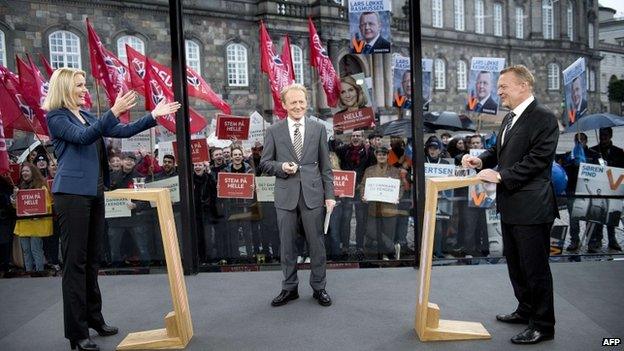
The most striking feature about Denmark's general election, to be held on Thursday, is that Danes are unlikely to feel the difference.
The left- and right-wing blocs, each a collection of five parties struggling for attention, are running head-to-head in one of the closest races in recent memories. And voters will find no large policy differences on which to base a decision.
Foreign policy is rarely mentioned in this election.
Instead, the agenda is a familiar one:
getting Danes to work, in a land of generous welfare benefits
keeping immigration at just the right level (and immigrants of just the right kind)
The welfare-benefits debate started rolling when the right-wing bloc's leader and former Prime Minister, Venstre's Lars Lokke Rasmussen, held his first campaign press conference.
In an attempt to provide a vivid example of welfare benefits disincentivising work, Mr Rasmussen told a story of the owner of a small company, Panorama, who had seen an employee quit because the extra income gained by working was too little.
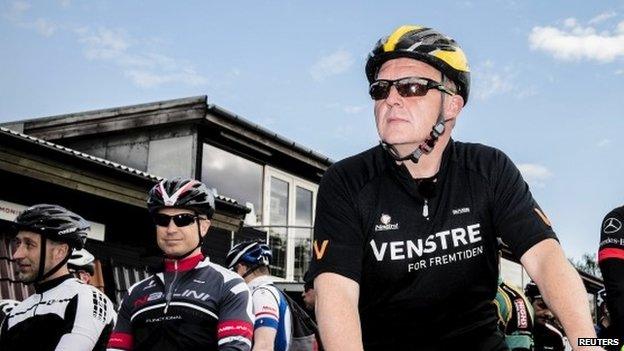
Opposition leader Lars Lokke Rasmussen, of the Venstre Party, took part in a cycling event as part of his campaign
Mr Rasmussen, his reputation previously tarnished by expenses scandals, was unable to guarantee the veracity of the story, and the former employee was nowhere to be found.
When the small business owner came forward to back Mr Rasmussen's story, the damage was done, and it was later revealed that he was a salaried campaigner for Venstre.
In the ensuing debate, myriad statistics about unemployment, benefits, salaries and technical details of the Danish social system pervaded the campaign coverage.
Parties, unions, industry organisations, non-governmental organisations and economists produced their own numbers, each arguing that the others were manipulating, lying or misinforming.
To most Danes, unfamiliar with the intricacies of Denmark's complex welfare benefits system, the debate will have seemed technocratic.
To the right-wing bloc, it was a disaster. The first week of the campaign saw a solid lead in the polls, which had persisted for more than three years, vanish in the course of a week.
The campaign agenda then turned to refugee and immigration policy, an electorally salient issue since the late 1990s.
Ever since then, refugee and immigration policy has been a sore spot for the Social Democrats. Once the singular dominant party in Danish politics, the Social Democrats have seen hundreds of thousands of voters abandon them for the Danish People's Party, founded in 1995 on popular disaffection with an immigration policy seen as too lax.
Today, about one in five Danish voters opt for the Danish People's Party. The Social Democrats have belatedly reacted by shifting to the right.
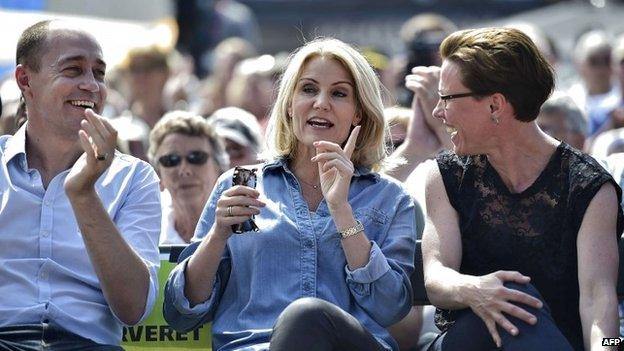
Helle Thorning-Schmidt (centre) has been Prime Minister since October 2011
To the consternation of many left-wing voters, the Social Democrat Prime Minister Helle Thorning-Schmidt regularly touts the new restrictions on asylum seekers her government has put in place.
Nevertheless, the agenda shifting from welfare benefits to refugee and immigration policy has benefited the right-wing bloc, seen by voters as more credibly committed to a restrictive position.
The right-wing bloc points to a large increase in refugee flows during the past four years as evidence of the current government's leniency. But this criticism ignores the impact of the Syrian crisis on refugee flows to all European countries.
Tempting alternatives
Though the ballot will feature no fewer than 10 parties, the election is typically framed in presidential terms as a choice between the former Prime Minister, Mr Rasmussen, and the current Prime Minister, Ms Thorning-Schmidt.
Perhaps due to frustration with this binary choice, the similarity of the domestic policy agendas, and the technocratic nature of the debate, voters have turned their attention away from established parties with government experience and towards newer, ideologically purer alternatives.
The best examples of such alternatives are the self-declared green party, Alternativet, literally meaning "the Alternative", and the libertarian, right-wing party Liberal Alliance. Both appeal to younger voters in particular.
Together with the right-wing populist Danish People's Party and the Red-Green Alliance to the left, they suggest that the Danes are hungry for more ideologically distinct politics.
Opinion polls suggest the current election will result in the lowest level of support for parties with government experience since 1973.
The EU popped up at about the halfway point of the campaign.
Partly in response to rising euroscepticism among right-wing voters, the right-wing bloc promised to work for an alliance with the UK government on EU matters.
In the 2014 European Parliament elections, the eurosceptic Danish People's Party's charismatic MEP Morten Messerschmidt personally received no less than 20% of the vote.
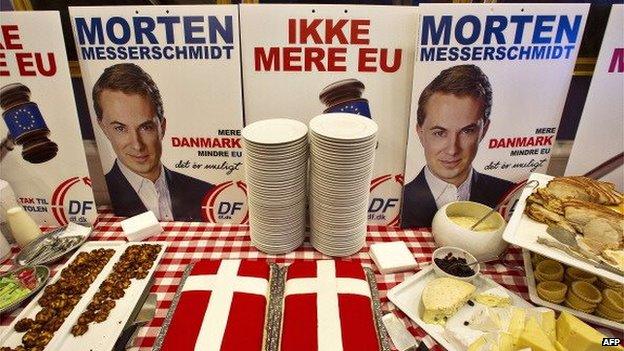
Morten Messerschmidt was the Danish People's Party's leading candidate in last year's European elections
There are precedents. In 2011, during the last right-wing government, the Danish People's Party managed to convince the governing parties to introduce a highly controversial border control, which prompted a heated response from Berlin and Brussels, external.
The Danish government had to backtrack and insist that the proposed initiatives would not violate the Schengen agreement, before realising that the border control was incompatible with a free-movement zone.
Should Denmark elect a right-wing government, the country's EU policy is indeed likely to be influenced by the Danish People's Party's euroscepticism.
This could make Denmark a possible ally in British negotiations on limiting EU cross-border welfare rights and the removal of the "ever closer union" phrase in the EU treaty, though many other member states will be critical of such demands, finding them destructive rather than pragmatic.
But the willingness to rethink Danish EU policy may be the biggest difference between right and left, as the dominant political agendas look very much the same.
The Danish election is thus best described as a close race for the status quo.
Rebecca Adler-Nissen is an associate professor and Frederik Hjorth is a PhD candidate in the Department of Political Science at the University of Copenhagen.
- Published27 May 2015
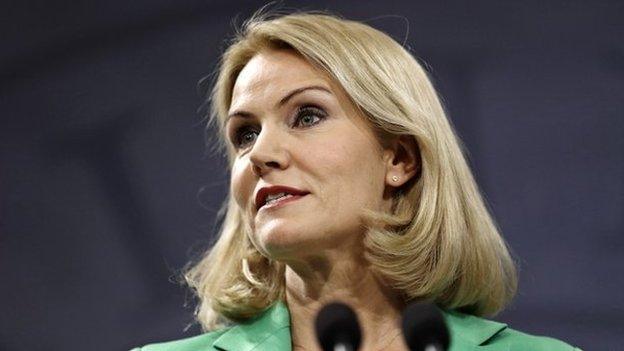
- Published27 January 2016